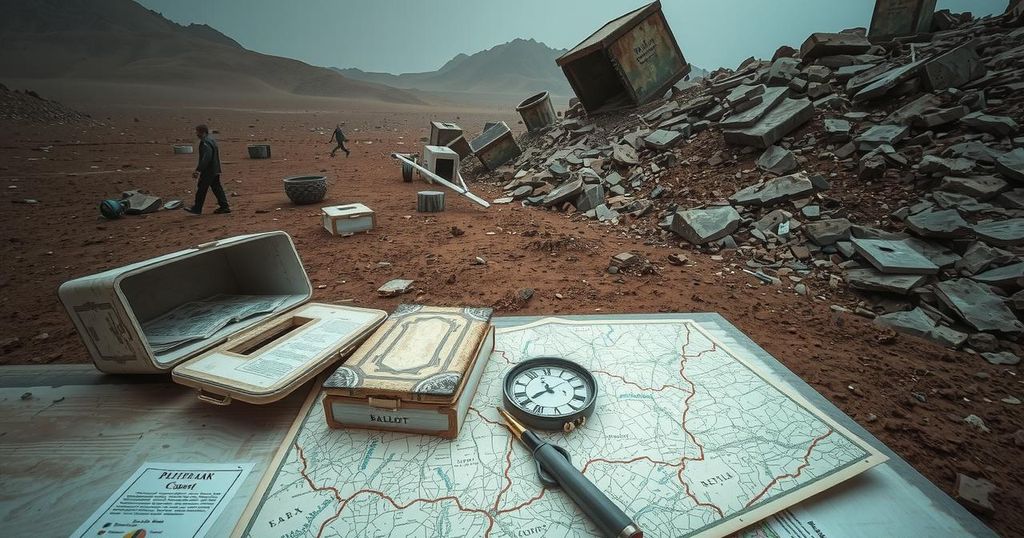Corneille Nangaa has transitioned from coordinating Congo’s 2018 controversial elections to leading a rebel coalition aimed at ousting President Tshisekedi. His movement is significantly bolstered by alliances with Rwandan-backed insurgents, which have long been active against the DRC’s central government. Despite facing accusations of past election misconduct and a death sentence for war crimes, Nangaa aims to reestablish governance and order, reflecting the DRC’s tumultuous political climate.
Corneille Nangaa, who previously coordinated the controversial 2018 election that elevated President Felix Tshisekedi, has reinvented himself as the leader of a coalition of Congolese politicians and rebel factions aiming to remove Tshisekedi from power. His transformation into a rebel commander is significantly reliant on alliances with Rwandan-backed insurgents, which have waged numerous conflicts against the DRC’s central government over the past twenty years. These Tutsi-led factions, particularly the M23, have seized key cities such as Bukavu and Goma, threatening stability in the region.
Nangaa, now donning military attire and a distinctive grey beard, articulates a vision that extends beyond merely capturing cities, focusing instead on overthrowing the government in Kinshasa, which he describes as the root of the nation’s issues. He commented, “Our objective is neither Goma nor Bukavu but Kinshasa, the source of all the problems,” implying a broader strategy for his insurgency. With numerous alliances claimed, he remains vague about the support he has garnered for his Alliance Fleuve Congo (AFC), which considers the M23 as its military contingent.
The United Nations and the international community have pressured Rwanda to withdraw its forces from the DRC, amid reports of 3,000 to 4,000 Rwandan troops providing substantial military support to the M23 rebels. Although Nangaa acknowledged Rwandan assistance, he also indicated that the Kinshasa government is backed by Burundi’s military. This raises concerns regarding a potential escalation of conflict involving neighboring countries.
A well-educated individual with a background in economics, Nangaa has had a career as an election consultant before leading Congo’s election commission in 2015 under former President Joseph Kabila. Following the contentious 2018 election, which was marred by allegations of fraud intended to keep peace, he faced sanctions by the U.S. for financial malfeasance. Despite his past controversies, Nangaa has sought to position himself as a leader of the opposition against Tshisekedi.
Following his removal from the election commission in 2021, Nangaa pivoted from intending to run for office to forming a coalition against the current president, alleging misconduct during the election that brought Tshisekedi to power. Now sentenced to death in absentia for serious crimes, Nangaa has expanded his coalition’s support beyond traditional Rwandan-backed areas to include various groups across different provinces in the DRC. His statements reflect a desire to restore governance and stability rather than merely pursue military conquests, as underscored by his remarks: “We want to reestablish order and give the Congolese people back a government.”
The Democratic Republic of Congo (DRC) has a complex political landscape characterized by historical tensions and conflicts that have led to multiple insurgencies and struggles for power. The political context is heavily influenced by past civil wars, regional dynamics involving neighboring countries such as Rwanda and Burundi, and a persistent lack of stability in governance and state authority. The electoral process in the DRC has faced persistent challenges and allegations of corruption, complicating the transition of power and contributing to unrest. Corneille Nangaa’s transition from election chief to rebel leader encapsulates the intertwining of governance issues and armed conflict in the DRC, raising critical questions about the future of democracy and statehood in the nation.
Corneille Nangaa’s emergence as a rebel leader highlights the fragility of governance in the DRC, as he seeks to capitalise on the discontent surrounding President Tshisekedi’s administration. His coalition’s reliance on Rwandan support underscores the intricate interplay of regional politics in the DRC’s conflicts. As Nangaa attempts to galvanize support to challenge the government, the implications for peace, statehood, and democracy in the DRC remain uncertain, foreshadowing increased tensions in the region.
Original Source: www.usnews.com






